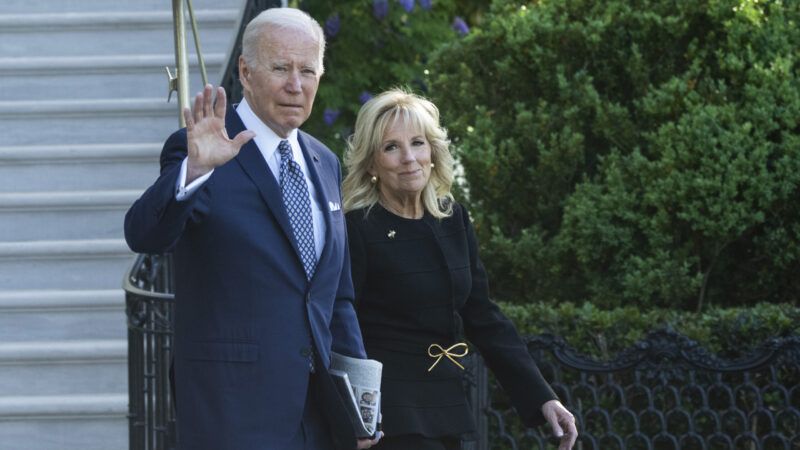Why Background Checks Do Not Stymie Mass Shooters
The vast majority do not have disqualifying records, and "universal" requirements are easily evaded.

A background check did not faze the man charged with murdering 10 people at a Buffalo grocery store on Saturday. The reason for that is straightforward: The shooter passed the background check that was completed when he bought the rifle used in the attack from a federally licensed dealer in Endicott, New York, because he did not have a disqualifying criminal or psychiatric record.
That is typically true of mass shooters. According to a recent National Institute of Justice (NIJ) report on public mass shootings from 1966 through 2019, 77 percent of the perpetrators bought guns legally. In some cases, teenagers or young adults obtained guns from their families. Just 13 percent of mass shooters obtained firearms through illegal transactions. In other words, background checks would have been no obstacle in 87 percent of the cases.
The Biden administration nevertheless "renewed its calls" to "expand national background checks in the wake of the attack in Buffalo," The New York Times reports, "as it has done time and again after mass shootings." Speaking to reporters today during President Joe Biden's trip to Buffalo, White House Press Secretary Karine Jean-Pierre said, "We're going to continue to call on Congress to expand background checks." House Speaker Nancy Pelosi (D–Calif.) likewise urged "passage of federal legislation to expand gun background checks, which she said was a 'huge priority' for Democrats."
The expansion that Jean-Pierre and Pelosi have in mind would notionally require background checks for all firearm transfers, meaning that anyone trying to sell a gun would have to complete the transaction through a federally licensed dealer. I say "notionally" because massive noncompliance with similar requirements at the state level suggests that a federal law would be widely flouted and impossible to enforce.
A would-be mass murderer with a disqualifying record therefore would not have much trouble finding someone willing to part with one of the country's 450 million or so firearms without bothering to seek out a licensed dealer so a background check could be conducted. And judging from the NIJ's data, only a small minority of perpetrators would need to evade background checks to begin with.
New York is one of the states that require "universal background checks." Even with perfect compliance, such laws cannot possibly make a difference for the vast majority of mass shooters, as illustrated by the Buffalo attack and many other notorious cases. Nor do those laws seem to have an impact on gun homicides in general, a much larger category of crime. A 2019 study found that California's 1991 expansion of background checks "was not associated with a net change in the firearm homicide rate over the ensuing 10 years."
A New York Times story about the NIJ study illustrates the sort of magical thinking that is required to believe that expanding background-check requirements is an effective way to prevent mass shootings. After explaining why background checks do not stymie the perpetrators of such crimes, the Times paraphrases a gun control activist who "said the only way to stop mass killings was to enact strengthened universal federal background checks, to compensate for the wide variation in state and local laws." The problem is not a lack of uniformity; it is the inherent limitations of background-check requirements.
Speaking of magical thinking, Democrats predictably latched onto the Buffalo massacre as a pretext to once again demand a renewed and expanded federal "assault weapon" ban. Never mind that New York has such a law, which demonstrably did not prevent or mitigate this mass shooting. Given the arbitrary distinctions drawn by such bans, they cannot reasonably be expected to have any meaningful effect on such crimes.
According to the NIJ report, 77 percent of the mass shooters used handguns. A quarter of the perpetrators used what the NIJ describes as "assault rifles," a category that is defined based on functionally unimportant characteristics. While a semi-automatic rifle with "military-style" features such as a folding stock, a pistol grip, or a threaded barrel counts as an "assault weapon" in New York, for example, removing those features makes the gun legal, even though it still fires the same ammunition at the same rate with the same muzzle velocity. Even if every gun that politicians classify as an "assault weapon" disappeared tomorrow, mass shooters would have plenty of equally lethal alternatives.


Show Comments (204)